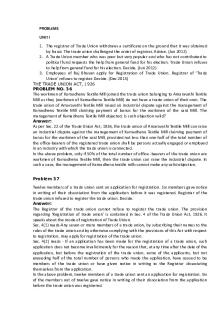LABOUR LAW NOTES GENERAL DOCX

| Title | LABOUR LAW NOTES GENERAL |
|---|---|
| Author | Ogeka Gechanga |
| Pages | 53 |
| File Size | 95 KB |
| File Type | DOCX |
| Total Downloads | 188 |
| Total Views | 547 |
Summary
LABOUR LAW – By Dennis Kiura 1.0 INTRODUCTION TO LABOUR LAW DEFINITION OF LABOUR LAW Labour Law deals with persons in capacity of workers generally in the labour law market. The relationship involves two parties at a basic level so that it can be termed as a relationship governing the employer and t...
Description
LABOUR LAW – By Dennis Kiura 1.0 INTRODUCTION TO LABOUR LAW DEFINITION OF LABOUR LAW Labour Law deals with persons in capacity of workers generally in the labour law market. The relationship involves two parties at a basic level so that it can be termed as a relationship governing the employer and the employee. Definition at a basic level is that an employee contracts to render services for a reward and employer contracts to pay that reward for work done. Often an employee is referred to as a "Worker". However the term worker is not used in labour law in "Marxian" sense but in the "capitalistic" sense. Labour law is also used interchangeably with Industrial Law. They are however different in that- 1. Industrial law covers employer employee relationship more adequately. 2. Industrial law is wider in application as it involves studies like taxation, Industrial property and social security not falling within labour law. 3. Labour law is a more preferred terminology. Labour law refers to a body of legal rules which regulates the relationship between- a. an employer and a worker b. an employer and workers c. employer(s) and trade union representing workers d. employers' organization and trade unions e. the state, employers, workers, unions and employer organizations SCOPE OF LABOUR LAW Labour Law is defined in part by its subject matter and in part by intellectual tradition. Intellectual tradition is the heritage of Prof. Otto Khan Freund and the Lord Wedderburn. The subject matter of labour law consists of rules that govern employer employee relationship. A broader perspective however would see labour law as a normative framework for the existence and operation of all the institutions of labour market i.e. Business Enterprise, Trade Unions, employers' association and state in its capacity as regulator and employer. As Prof. Hepple states, "Labour law starts from the idea of subordination of individual worker to capitalist enterprise. That it is above all the law of independent labour (self employed) and it is specific to categories of economic relationships which involve exchange of personal services for remuneration. Labour law is concerned with how the relationships are constituted and regulated." Its scope accordingly extends from the individual to collective, from contract of employment to relationships between institutions of organized labour and capital and to conduct and resolutions of conficts between them. Mount Kenya University – Bachelor of Laws 3...
Similar Free PDFs

LABOUR LAW NOTES GENERAL
- 53 Pages

Labour law study notes
- 65 Pages

Collective labour law notes
- 18 Pages

Labour Law - Notes - LLB
- 198 Pages

Notes - Labour Law I
- 76 Pages

Labour Law Notes
- 198 Pages

Labour law notes unit 2
- 12 Pages

Labour LAW Notes engoru-1
- 54 Pages

Labour LAW Class Notes updated
- 117 Pages

15labour-law-II - Labour law notes
- 191 Pages

Labour Law Theme 2
- 14 Pages

Labour law - Summary Llb
- 211 Pages

Labour Law - II
- 75 Pages

LABOUR LAW IN TANZANIA
- 19 Pages

Labour law-2 mcqs
- 47 Pages
Popular Institutions
- Tinajero National High School - Annex
- Politeknik Caltex Riau
- Yokohama City University
- SGT University
- University of Al-Qadisiyah
- Divine Word College of Vigan
- Techniek College Rotterdam
- Universidade de Santiago
- Universiti Teknologi MARA Cawangan Johor Kampus Pasir Gudang
- Poltekkes Kemenkes Yogyakarta
- Baguio City National High School
- Colegio san marcos
- preparatoria uno
- Centro de Bachillerato Tecnológico Industrial y de Servicios No. 107
- Dalian Maritime University
- Quang Trung Secondary School
- Colegio Tecnológico en Informática
- Corporación Regional de Educación Superior
- Grupo CEDVA
- Dar Al Uloom University
- Centro de Estudios Preuniversitarios de la Universidad Nacional de Ingeniería
- 上智大学
- Aakash International School, Nuna Majara
- San Felipe Neri Catholic School
- Kang Chiao International School - New Taipei City
- Misamis Occidental National High School
- Institución Educativa Escuela Normal Juan Ladrilleros
- Kolehiyo ng Pantukan
- Batanes State College
- Instituto Continental
- Sekolah Menengah Kejuruan Kesehatan Kaltara (Tarakan)
- Colegio de La Inmaculada Concepcion - Cebu
